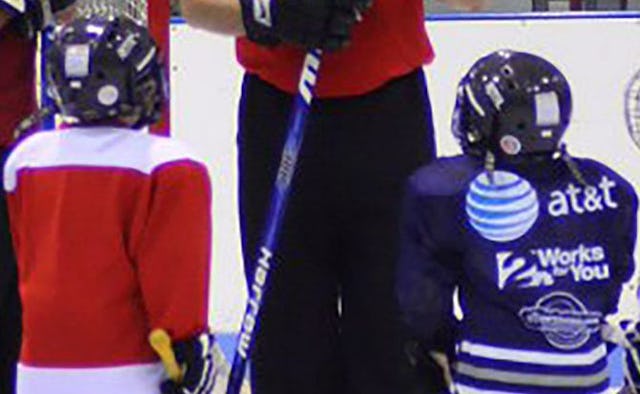Helping My Son Survive the Agony of Defeat

I think all the time about the confounding, mysterious nature of memory, and of how it is the smallest, most minute moments that often endure the most sturdily for me. Once in a while, though, there is an experience that trumpets its power even as I live it.
My son Whit’s championship hockey finals were one such moment. His team made it to the finals in their league. I can’t speak for the other parents, but I know that this team came together in a way that I never imagined back in September. The playoffs occurred over the middle weeks of March, and lots of kids were out on spring break. Whit missed the two semifinal games, in fact, because we were in the Galapagos. But he was back for the championship game, albeit basically fresh off a 24-hour trip home and a redeye flight.
At full strength, our team has 12 players. The day of the finals, we had eight. One was a goalie, which left seven. That means only two subs. The other team had fully three times as many subs as we did. They were favored. We lost to them the last time we faced them. I admit I watched our boys—who seem simultaneously so little and so big when they are on the ice—with a vague sense of trepidation. This might be ugly, I thought to myself.
Oh, how wrong I was.
Those boys—and I say boys because our female member was not there—skated with more grit and heart than I have ever, ever seen. They were absolutely exhausted; the lack of subs took a major toll. But the other team never led, and with five minutes to go we were up 5-3. When the third period ended we were tied 5-5. This led to a five-minute sudden death playoff, and somehow, with a determination I’d never seen before, the boys kept it tied. Nobody scored. We screamed ourselves hoarse, and a wild hope—we could actually win this—galloped in my chest.
Next came a shoot-out. I’ve never seen a shoot-out before, but basically the teams take turns skating from the middle of the ice and shooting on the other goalie. The first round is five players each. We were down one goal by the time it was Whit’s turn. I knew—and he knew—that it came down to this. It was up to him. He had to score or the entire game was lost. I can’t imagine the pressure that he felt on his tiny shoulders, and my eyes filled with tears as I watched.
He did not score. 36 minutes of regular play, five minutes of overtime, and four rounds of shoot-outs came to an end and the other team flooded the ice, jubilant. I could see from my perch in the stands, through Whit’s mask, that he was crying. By the time they came off the ice I saw that most of the team was.
Whit was irate and upset all the way home, and we let him rant. But by the time he went to bed, he was sorrowful. “I let my team down, Mum,” he told me in a whisper. I lay next to him in his bed and talked about how proud I was of him and his whole team. I told him I had rarely seem him dig deep like that. I told him he had been tenacious and brave and strong in the face of long odds and deep exhaustion. I told him that sometimes things don’t go our way, and this one didn’t. I told him I understood that it felt like it was his fault, though of course it was not that simple. I told him I was wildly, incredibly impressed with how his team played and held off the number one seed who so outnumbered them. They had been the underdogs and while they didn’t win, I’m pretty sure everybody in that rink was impressed by their play.
My husband came to tuck Whit in and offered that it was way better to have gotten to the finals, and to face that disappointment, than not to have gotten there at all. Right? Whit thought about this for a moment before grudgingly agreeing. I considered it too: not making the championship and not having lived through that white-knuckle game would have hurt less. But what an achievement that game was. Just before bed we’d gotten an email from Whit’s coach sharing the image of Whit lying on the ice after being checked into the boards, with three minutes of time left, doing everything in his power to keep the puck from going down towards our goal. “What else could a coach ask for?” he asked, and reading that, I cried. All eight of those boys gave it everything they had.
Matt left and I lay with Whit for a few more minutes. “It was a really great season, Whit, and an absolutely remarkable game today,” I told him in the hushed darkness. He sighed and I felt him nod on the robot-print pillow next to me. He rolled on his side, pulling his monkey, Beloved, closer to his neck. “I’m really, really proud of you. And I think you’ll remember this day for the rest of your life.”
And so will I.
This article was originally published on